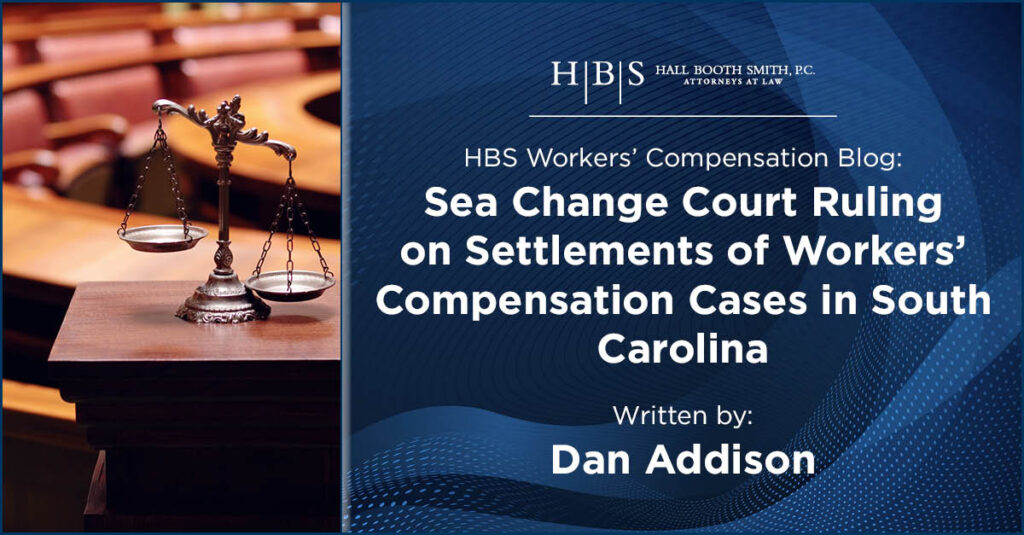
Sea Change Court Ruling on Settlements of Workers’ Compensation Cases in South Carolina

Written by: Dan Addison, Esq.
South Carolina recently had a sea change shift in settlements involving workers’ compensation claims, as well as the procedural nature of Mediations of any workers comp case.
In a recent decision from the South Carolina Court of Appeals issued on August 3, 2022 — in which I represented the defendants — the Court reversed decades of procedural behavior by all stakeholders in the workers’ comp system as to settlements, and more specifically, the enforceability of a preliminary settlement agreement prior to the “official Full and Final Release” documentation that had been the standard for decades among all practitioners.
In Ex Parte: Robert Horne, the Court reversed a ruling from the Full Commission that held the defendants could withdraw their settlement of the Claimant’s future medical costs after claimant died unexpectedly in a car accident shortly after mediation.
Background
Claimant was a mechanic and dock worker who was severely injured in an accident involving a fork lift. Claimant sustained numerous debilitating injuries, including major injuries to his internal organ region, requiring substantial medical care. Defendants quickly admitted to Claimant’s entitlement to permanent and total disability. An order was issued in 2014 finding Claimant permanent and totally disabled, entitling Claimant to the remainder of the 500 weeks of indemnity for his injuries. He was awarded lifetime medical treatment for his extensive medical issues from the injuries.
In 2016, Claimant threatened a medical provider with a handgun after the doctor had discussed a possible weening of Claimant from Oxycontin pain medicine. The doctor refused to provide Claimant with any further treatment. This placed Defendants into a no-win situation of being required to provide medical treatment but also being exposed to possible liability for any failure to disclose Claimant’s behavior with his previous provider.
As such, Defendants requested a status conference with the Chairman of the SCWCC, Commissioner Glenn Beck. Comm. Beck strongly suggested the parties mediate the case as to the benefits remaining on the claim, the future medical benefits.
At the voluntary mediation, the parties agreed to a settlement of the only remaining benefits (Claimant’s future medical expenses) for $1 million. The parties executed an simple three-page “Agreement Following Mediation Agreement,” in which Defendants agreed to: (1) settle the future medical expenses for $1 million; (2) pay the sum to Claimant’s attorneys in trust pending execution of the final settlement and release documents; and (3) prepare formal Agreement and Release document setting forth all provisions of the case settlement, as per typical procedure in workers’ comp matters.
Procedural Difficulties
Settlement Term Number 3 is the crux of this matter. Per South Carolina Code § 42-9-390, the parties can agree to a settlement, but procedural requirements required the Commission to approve all settlements, which was essentially just a rubber-stamped signature of the jurisdictional Commissioner.
In 2007, the statute was amended requiring that after a settlement agreement was reached, the defendants were to file a copy of the signed settlement agreement with the Commission. Thus, the issue here was whether the Agreement Following Mediation Conference met the requirement of a settlement agreement under South Carolina law.
The lower decisions of the Single Commissioner and the Full Commission agreed with Defendants that the additional requirements of the controlling regulations, R67-801 and R67-803, which require a formal Agreement and Release (known as a “clincher” by practitioners) to include certain content, including the facts at issue, the nature of the injuries, and the payment and the terms of the payment.
In this particular case, Claimant was a Medicare recipient, so a large Medicare set-aside was required for the settlement, especially considering the only amounts being paid were for future medical care.
Claimant died just days after the Mediation, as the result of a single-vehicle car wreck. The Clincher settlement document was being worked on by the parties, but the settlement check had been sent to Claimant’s counsel for placement in their trust account.
Upon learning of Claimant’s death, Defendants determined that per the dictates of the statute—and especially since the settlement was for future medical costs—the settlement had abated upon Claimant’s death. As such, Defendants cancelled their settlement payment check and informed Claimant’s counsel of their decision to revoke settlement based on Claimant’s death.
Claimant’s counsel attempted to force a filing of the Agreement Following Mediation Conference as the Agreement and Final Release in order to comply with the statutorily required documentation and to enforce the settlement. The Commission refused to accept the document as the Agreement and Final Release. Both the Single Commissioner and the Full Commission agreed that any party could revoke and withdraw any settlement prior to the filing of the formal Agreement and Final Release documentation, as required by R. 67-801 and R. 67-803.
Standard Changes
The Commission, and all practitioners in the workers’ comp arena, had been following this same standard for decades. With the advent of formal mediation in workers’ comp brought about by R. 67-1801 et seq., enacted in 2013, mediators began using, for simplicity purposes, memorialization documents to provide some written guidance as to what the parties agreed to at mediation.
These post-mediation agreement documents were neither formal, nor uniform. Typically, the mediator had their own preferred version as a typed template and terms were handwritten at mediation, exactly as occurred in the case at hand. These informal documents were not official and had no weight at the Commission on any issue.
Parties often put down vague terms regarding the settlement terms, with additional discussions after mediation to perfect the final settlement documents. With this ruling from the Court of Appeals, those days are over—per the ruling from the Court, any written statement of agreement, regardless of how simple or vague, can stand as a clear and enforceable memorialization of the complete terms of the settlement.
It is now very much a “Caveat Scribe” and “Caveat Signatorious” world. The drafters and signers of any settlement document must take extra care as to what they create and sign, as any written settlement document in a workers’ comp matter in South Carolina is now enforceable as per this ruling from the Court.
After the Court’s ruling, the parties settled the matter, and there was no further appeal. As such, this reported decision is now the law of the land in South Carolina.
Disclaimer
This material is provided for informational purposes only. It is not intended to constitute legal advice nor does it create a client-lawyer relationship between Hall Booth Smith, P.C. and any recipient. Recipients should consult with counsel before taking any actions based on the information contained within this material. This material may be considered attorney advertising in some jurisdictions. Prior results do not guarantee a similar outcome.


Leave a comment
You must be logged in to post a comment.